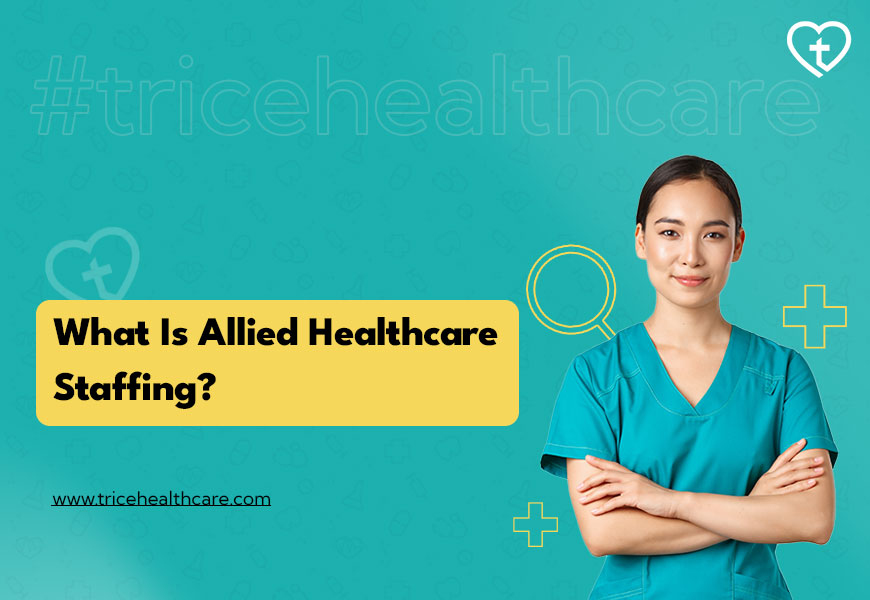
Healthcare is a complex ecosystem, and behind every successful hospital, clinic, or long-term care facility is a team that goes beyond doctors and nurses. This is where allied healthcare professionals step in. They are the technicians, therapists, and specialists who keep patient care moving seamlessly, from diagnostic testing to rehabilitation.
With increasing demand for patient services, coupled with workforce shortages, many facilities find it difficult to recruit, train, and retain allied healthcare professionals in-house. That’s where allied healthcare staffing agencies come in, helping organizations like yours maintain quality care without the stress of constant recruitment.
Let’s break down what allied healthcare staffing is, why it matters, and how agencies like Trice Healthcare can make a measurable difference for your facility.
What Does “Allied Healthcare” Mean?
“Allied healthcare” is a broad term that covers a wide spectrum of medical support roles. These are healthcare workers who aren’t physicians or nurses but provide vital services in diagnosis, treatment, and patient support.
Common allied healthcare roles include:
- Medical Laboratory Technicians – conducting diagnostic tests.
- Radiology and Imaging Technologists – performing X-rays, MRIs, CT scans, etc
- Respiratory Therapists – assisting patients with breathing issues.
- Physical, Occupational, and Speech Therapists – helping patients recover and improve quality of life.
- Pharmacy Technicians – supporting medication management.
- Dietitians and Nutritionists – guiding patients with diet plans for better outcomes.
- Medical Assistants – bridging administrative and clinical tasks.
Each role may look different, but together they represent nearly 60% of the U.S. healthcare workforce, making them indispensable.
What Is Allied Healthcare Staffing?
Simply put, allied healthcare staffing refers to the process of hiring and placing allied health professionals on either a temporary, permanent, or travel basis. Staffing agencies act as a bridge between healthcare facilities that need qualified staff and professionals seeking flexible opportunities.
For facilities, staffing agencies reduce the burden of long hiring cycles, while for professionals, they open doors to new roles, experiences, and locations.
Agencies like Trice Healthcare specialize in sourcing, vetting, credentialing, and matching allied professionals with facilities that need immediate support.
Why Do Healthcare Facilities Struggle with Staffing?
Staffing coordinators and hiring managers face unique challenges:
- Access to a Wider Talent Pool – Agencies have databases of pre-screened candidates ready to step in.
- Expertise in Hiring – Specialized recruiters understand the qualifications and skills needed for each allied role.
- Flexibility – Agencies provide temporary, temp-to-perm, or permanent staffing solutions depending on your need.
- Credentialing Support – Agencies handle background checks, license verification, and compliance, so you don’t have to.
- Faster Turnaround – Instead of waiting weeks to fill a role, you can onboard qualified professionals in days.
These pain points create risks for healthcare facilities like patient care delays, staff burnout, and even lost revenue.
The Role of Allied Healthcare Staffing Agencies
Staffing agencies exist to relieve these burdens. When you partner with a trusted healthcare staffing firm, you gain:
- Access to a Wider Talent Pool – Agencies have databases of pre-screened candidates ready to step in.
- Expertise in Hiring – Specialized recruiters understand the qualifications and skills needed for each allied role.
- Flexibility – Agencies provide temporary, temp-to-perm, or permanent staffing solutions depending on your need.
- Credentialing Support – Agencies handle background checks, license verification, and compliance, so you don’t have to.
- Faster Turnaround – Instead of waiting weeks to fill a role, you can onboard qualified professionals in days.
Benefits of Partnering with an Allied Healthcare Staffing Agency
For staffing coordinators, hiring managers, and administrators, the decision to partner with a staffing agency can transform operations. Here are the most important benefits:
1. Improved Patient Care
When allied positions go unfilled, patient care suffers. Imaging delays, slow lab results, or limited therapy sessions can lead to dissatisfaction and even poor outcomes. By filling these roles quickly, agencies help you maintain continuity of care.
2. Reduced Burnout for Core Staff
Your full-time staff already have demanding schedules. Asking them to take on extra shifts or cover gaps can lead to burnout and turnover. Supplementing with allied staff eases the pressure, creating a healthier work environment.
3. Cost Efficiency
While agency fees are a consideration, the overall cost of long-term vacancies, overtime pay, and recruitment expenses is often higher. Agencies help optimize your staffing spend by ensuring positions are filled efficiently.
4. Workforce Flexibility
Not all facilities need permanent staff for every role. Travel or temporary allied staff allow you to scale your workforce up or down based on census levels or seasonal demand.
5. Quality and Compliance Assurance
Healthcare staffing firms like Trice Healthcare prioritize compliance. With built-in credentialing, background checks, and licensure verification, you can be confident you’re bringing in professionals who meet all standards.
6. Focus on Core Operations
By outsourcing recruitment, your internal teams can focus on running the facility, managing staff, and improving patient outcomes, rather than juggling resumes and interviews.
Allied Healthcare Staffing in Action: A Real-World Example
When a regional hospital is heading into flu season, the surge in patients requires additional respiratory therapists, lab technicians, and imaging staff. Instead of pulling resources from other units or forcing overtime, the hospital partners with a staffing agency.
Within a week, pre-screened allied professionals are placed, ensuring patients receive timely diagnostics and treatment. Meanwhile, full-time staff maintain balanced workloads, reducing burnout risk.
This is the power of allied healthcare staffing ensuring the right professionals are in place at the right time.
The Future of Allied Healthcare Staffing
As healthcare evolves, the demand for allied professionals will only increase. Factors such as an aging population, advancements in medical technology, and a shift toward preventive care are expanding the roles allied workers play.
Staffing agencies are expected to continue innovating using technology for faster matching, expanding talent pipelines, and offering workforce analytics to help facilities plan proactively.
For hiring managers and staffing coordinators, partnering with a forward-looking agency is not just about filling today’s vacancies but preparing for tomorrow’s healthcare landscape.
Trice Healthcare for All Your Allied Healthcare Staffing Needs
Allied healthcare staffing isn’t just about plugging gaps. It’s about creating a sustainable workforce strategy that ensures high-quality patient care.
For healthcare facilities, the benefits are clear: improved patient outcomes, reduced staff burnout, compliance assurance, and cost efficiency. For allied professionals, staffing agencies open doors to career growth and flexibility.
At Trice Healthcare, we understand that every facility has unique needs. Whether you’re seeking temporary staff for seasonal surges or permanent placements to strengthen your team, our goal is to deliver reliable, credentialed allied healthcare professionals who align with your mission of care.
In a healthcare world where staffing challenges are constant, the right partner can make all the difference.

 By Richa Sharma
By Richa Sharma

